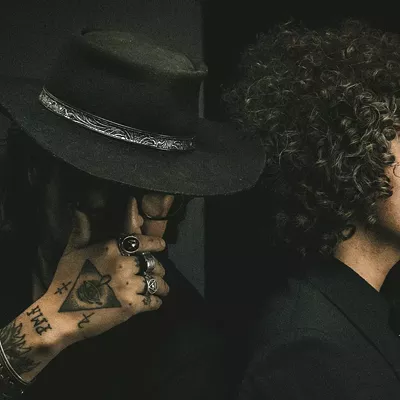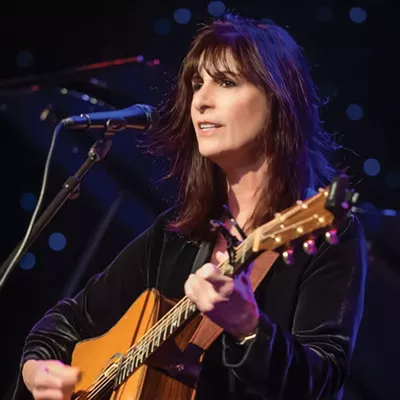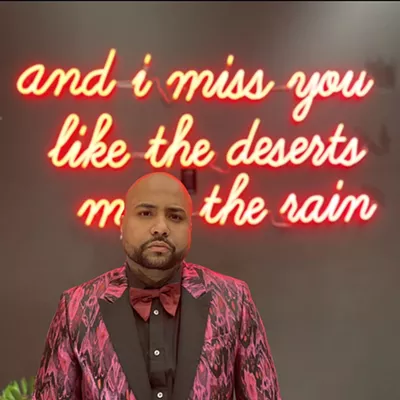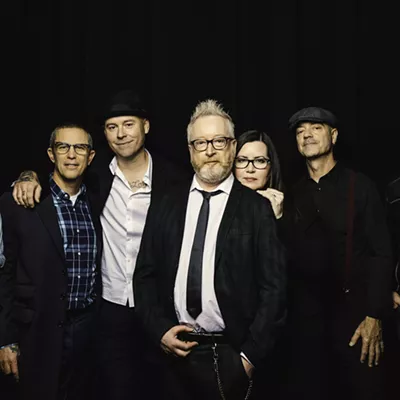Kishi Bashi must've really been feeling the love last year, following the release of his debut full-length album, 151a.
The violinist and singer-songwriter, who also employs electronic effects, tape loops and beat-boxing in his charming performances, was named by Bob Boilen, the host of NPR's All Songs Considered, as his favorite new artist of 2012.
Kishi Bashi's tunes also were licensed for prominent TV ads for Sony, Smart cars, American Express and Microsoft—you've likely heard the über-catchy "Bright Whites" in that ubiquitous Windows 8 commercial.
And Kishi Bashi's last performance in Tucson, about a year ago at Club Congress, caused that venue's website to effuse that it was "without a doubt one of our favorite and most impressive shows of the year!"
He returns to Club Congress on Tuesday, March 5, with opening acts Shugo Tokumaru and Tall Tall Trees.
Kishi Bashi is the performance pseudonym of 37-year-old K. Ishibashi, whose first name at birth was Kaoru. Ishibashi was born in Seattle and his family moved when he was young to Norfolk, Va., where he was raised. He grew up listening to pop music and studying classical violin.
"My parents listened to all the regular stuff you would expect: John Denver, the Beatles and traditional folk music. So that was definitely influential," Ishibashi said on the phone from his home before the current tour began.
"Of course, like most songwriters, I would say that the Beatles were a huge influence, but I liked Paul's songs better than John's. I was also very attracted to the lyrics of Tom Waits, Bob Dylan and Neil Young."
Ishibashi said he started playing violin at seven and has dabbled in several instruments on the side. "I've always played, but singing has been a recent thing."
When he started studying violin, Ishibashi learned the Suzuki method, a popular form of music instruction for young children. It was developed in the mid-20th century by Shin'ichi Suzuki, a Japanese violinist, eventually spreading throughout Asia and to the United States, Europe and Africa. The method was adapted for flute, recorder, piano, guitar, cello, viola, bass, organ, harp and voice.
The first musical-education experience for thousands of small children in the United States since the 1960s—including this writer -has been studying Suzuki-method violin.
"Suzuki is great because it is focused on internalizing melodies. It's always helped me because my ear adjusts quickest to melodies. My wife teaches Suzuki violin. It's fantastic for building character and the level of self-confidence it instills in kids is priceless.
"It's not only about discipline, and it stresses other involvements outside of the lessons and practice time. Suzuki's goal was encouraging the students to be good human beings within and outside of music practice."
As he grew, though, Ishibashi became convinced he didn't want to be part of the symphonic-music world.
"All the symphonic players I met when I was growing up in Virginia didn't seem very happy, and it's a hard business. There aren't a lot of jobs to go around. I noticed, in general, they seemed very detached from any consciousness of popular music, and that was a large part of my life. And it doesn't really pay great either."
Ishibashi began playing in jazz and pop bands but he was often relegated to the background. "It wasn't really the full glory of being in a band. It often seemed like my violin was an added luxury and not integral to the music."
He eventually moved to New York City, and has since found fame playing with such artists as Regina Spektor, Sondre Lerche and, especially, of Montreal—all artists that made better use of Ishibashi's playing and inspired him to exercise his creative voice. He also learned a thing or two about appreciating his fans.
"I think working with Regina Spektor and (of Montreal's) Kevin Barnes kind of taught me how really committed they are to their fans. They inspired me to reach further than I had before, and to consider how important your music can be to the listeners' lives. I really didn't think about that relationship in those terms before."
He also was a founding member of the Brooklyn-based band Jupiter One, which made what has been called a combination of angular post-punk and psychedelic-inflected indie rock. By the time that group came together, in 2003, Ishibashi was playing guitar and singing. The group made two albums before disbanding, after which he conceived Kishi Bashi.
He said the birth of Kishi Bashi surprised even him, and he quickly released a four-song EP, Room for Dream, which features a duet with Barnes and is only available through online platforms such as iTunes and Bandcamp.
"It was something I made really quickly. I put my whole heart into it after Jupiter One crumbled and came to a halt. I was coming out of this darkness; I was frantic to create music. I thought this was like my last effort to create something worthwhile or I would have to go back to being a sideman again."
Ishibashi left New York with his wife and child, moving into his parents' Virginia home for a few months. He eventually set up a studio in their attic, which is where 151a was recorded, funded in large part by a Kickstarter campaign. It includes reworked versions of two songs—"Bright Whites" and "Manchester"—that were on Room for Dream.
Although Ishibashi created the album under stressful conditions, it has turned out to be a dream-pop masterpiece. Its symphonic expansiveness is breathtaking considering he created almost all the music himself. And its success has exceeded any of his expectations.
"Now, instead of it being my last chance, that album is a beginning. It's just one of many albums I will make ... I am already planning the next one."
And, this time around, when he plays in Tucson, Ishibashi won't be alone. He'll be accompanied onstage by banjo player Mike Savino (of Tall Tall Trees) and keyboardist Elizabeth Ziman (of Elizabeth and the Catapult fame).
By the way, Ishibashi said his album's cryptic title, 151a, is a rough transliteration (pronounced "ichi-go ichi-eh") of "a pretty popular Japanese phrase that means 'one moment, one meeting.' It sort of means that we should cherish the beauty of this unique moment now."







